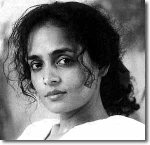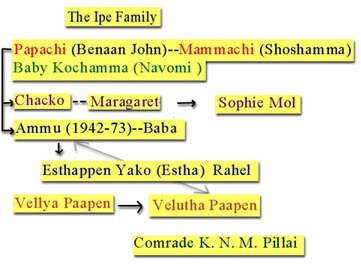

![]() Her
life & Social Background
Her
life & Social Background
![]() About
The
Novel
About
The
Novel
![]() Time
Line & Major Themes
Time
Line & Major Themes
![]() Chapter
II
Chapter
II
![]() Relevant
Links
Relevant
Links
"A lot of the atmosphere of A God of Small Things is based on my experience of what it was like to grown up in Kerala. Most interestingly, it was the only place in the world where religions coincide, there is Christianity, Hinduism, Marxism and Islam and they all live together and rub each other down. When I grew up it was the Marxism that was very strong, it was like the revolution was coming the next week¡K. To me, I couldn¡¦t think of a better location for a book about human beings."
( "in some way the structure of the book ambushes the story¡K. In the first chapter I more or less tell you the story, but the novel ends in the middle of the story¡K." ( |
1969--communist march; Sophie Mol's (8) visit, death, and funeral; Ammu and Velutha; Velutha's death 1973--Ammu's death (31, p.5 ''a viable die-able age'') 1992--the narrative present--Estha ('the quietness,'' ''re-Returned''); Rahel (divorced, back for the States); Baby Kochamma (satellite TV and diary) 
The two kids: twin, from we and us to they
-- Here as well as in the novel we see an interactions and interpenetration
of Big God (the World and Social Machine) and Small God (small lives).
p.33 "That it [the story] really began in the days when the Love Laws were made. The laws that lay down who should be loved, and how. And How much.'' caste is ''the defining consideration in all Indian politics, (and) in all Indian marriages, (but) the lines are blurring. India exists in several centuries simultaneously.'' caste and gender: e.g. Baby Kochamma's understanding of the status of an Indian woman pp.44-5 time: 12/1969 (the day before Sophie Mol's arrival)
I. the influence of (neo)colonial cultures [British and American]:
1. Pappachi's moth (p.48): 3. Baby Kochaman's complete absorption of colonial cultures.
-- Mammachi's pickles and talents in playing the violin: the former is taken over by Chacko and the latter, stopped by her husband;IV. The Symbolic "Small Things":
|
I. General
-- "When I think back on all the things I have done I think from a very early age, I was determined to negotiate with the world on my own. There were no parents, no uncles, no aunts; I was completely responsible for myself." -- ""My mother says that some of the incidents in the book are based on things that happened when I was two years old. I have no recollection of them. But obviously, they were trapped in some part of my brain."
IV. Social Issues: V. Interviews
figures in the novel reviews the novel (free) with NY times to read this review.
|